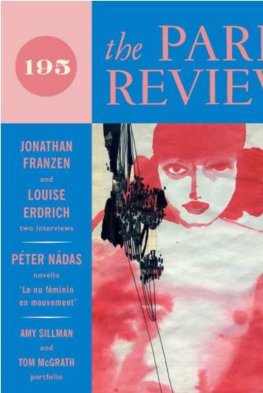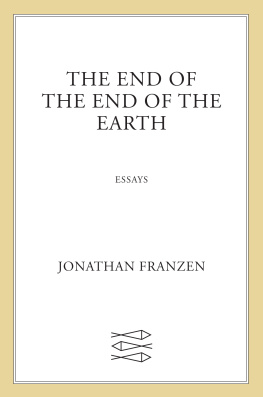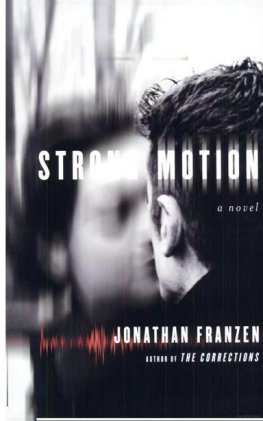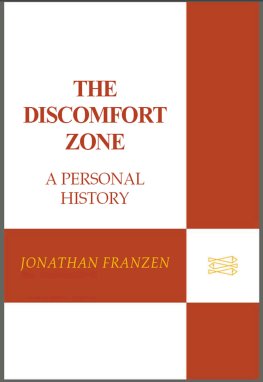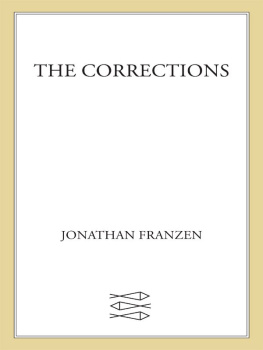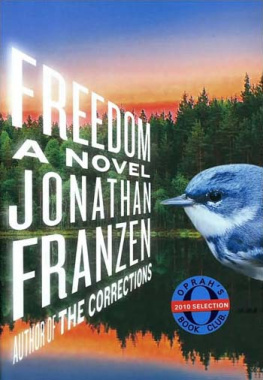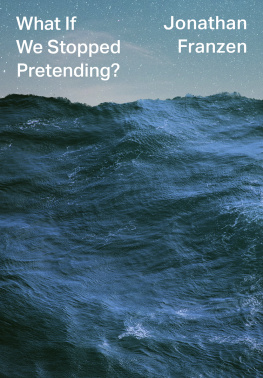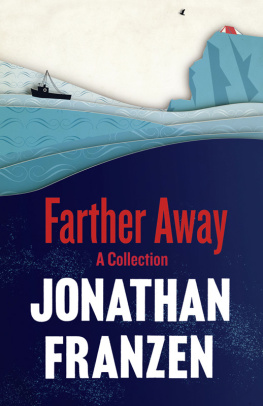Jonathan Franzen - How He Came to Be Somewhere : An Interview and Three Early Stories
Here you can read online Jonathan Franzen - How He Came to Be Somewhere : An Interview and Three Early Stories full text of the book (entire story) in english for free. Download pdf and epub, get meaning, cover and reviews about this ebook. City: New York, year: 2010, publisher: The Paris Review, genre: Prose / Non-fiction. Description of the work, (preface) as well as reviews are available. Best literature library LitArk.com created for fans of good reading and offers a wide selection of genres:
Romance novel
Science fiction
Adventure
Detective
Science
History
Home and family
Prose
Art
Politics
Computer
Non-fiction
Religion
Business
Children
Humor
Choose a favorite category and find really read worthwhile books. Enjoy immersion in the world of imagination, feel the emotions of the characters or learn something new for yourself, make an fascinating discovery.
- Book:How He Came to Be Somewhere : An Interview and Three Early Stories
- Author:
- Publisher:The Paris Review
- Genre:
- Year:2010
- City:New York
- ISBN:9780857861740
- Rating:3 / 5
- Favourites:Add to favourites
- Your mark:
- 60
- 1
- 2
- 3
- 4
- 5
How He Came to Be Somewhere : An Interview and Three Early Stories: summary, description and annotation
We offer to read an annotation, description, summary or preface (depends on what the author of the book "How He Came to Be Somewhere : An Interview and Three Early Stories" wrote himself). If you haven't found the necessary information about the book — write in the comments, we will try to find it.
Jonathan Franzen: author's other books
Who wrote How He Came to Be Somewhere : An Interview and Three Early Stories? Find out the surname, the name of the author of the book and a list of all author's works by series.
How He Came to Be Somewhere : An Interview and Three Early Stories — read online for free the complete book (whole text) full work
Below is the text of the book, divided by pages. System saving the place of the last page read, allows you to conveniently read the book "How He Came to Be Somewhere : An Interview and Three Early Stories" online for free, without having to search again every time where you left off. Put a bookmark, and you can go to the page where you finished reading at any time.
Font size:
Interval:
Bookmark:
How He Came to Be Somewhere
An Interview
and
Three Early Stories
by
Jonathan Franzen
About Jonathan Franzen
JONATHAN FRANZEN WAS BORN IN 1959 in Chicago and grew up in St Louis, where his father was a civil engineer. He majored in German at Swarthmore College and from 1983 to 1987 worked part-time as an earthquake analyst for the Department of Earth and Planetary Sciences at Harvard University. After his first novel, The Twenty-Seventh City, was published in 1988, he received a Whiting Writers Award. His second novel, Strong Motion, appeared in 1992. He is a Guggenheim Fellow and a frequent contributor to the New Yorker. He lives in New York City and Santa Cruz, California.
How He Came to Be Somewhere

The Franzens: Bob, Irene, Jonathan, Tom.
Webster Groves, MO
Introduction
by Stephen J. Burn
Jonathan Franzens fiction bears the mark of a Midwest upbringing, his books preoccupied with quiet lives nurtured there and broken apart by contact with the rest of the world. But four long novels into an unusually public career, Franzen now moves about the country quite a bit, living most of the year in New York, where he writes in an office overlooking busy 125th Street, and some of it in a leafy community on the outskirts of Santa Cruz, where I met him just a few days before his most recent novel, Freedom, was released.
The scale of Freedoms rapturous reception isnt yet evident on the morning of our first conversation, though the book has already been called the novel of the century, and its author has just become the first writer in a decade to appear on the cover of Time magazine; a visit to the White House is soon to come. At the same time, two popular female novelists have been arguing, via Twitter, that Franzen owes his stature to the prejudices and gender asymmetries of book reviewing, and there are hints, too, that a broader backlash is brewing. (In London a few weeks later, hell have his glasses stolen by pranksters at a book party.) As we drive through the morning fog, Franzen recounts both sides to me as if he has no vested interest in either position his stance is that of a detached, and slightly amused, observer.
Jonathan Franzen was born in 1959, in Western Springs, Illinois, and raised in Webster Groves, a suburb of St. Louis. The youngest of three children, Franzen grew up in a home dominated by pragmatic parents his father an engineer, his mother a homemaker who saw little value in the arts and who encouraged him to occupy himself instead with more practical subjects. A fascination with the sciences hangs over much of Franzens early writing, composed before his arrival at Swarthmore College. One unpublished story describes a visit from Pythagoras. An early play about Isaac Newton was championed by a physics teacher at Webster Groves High School.
Franzen describes his first book, The Twenty-Seventh City (1988), as a sci-fi novel that is all fi and no scia concept-driven omnibus fiction in which a group of influential and politically ambitious Indians, led by the former police commissioner of Bombay, infiltrate the bureaucracy of an unspectacular Midwestern town and terrorize its residents. The Twenty-Seventh City is set in his native St. Louis, but Franzen wrote the majority of the novel while employed as a research assistant at Harvard Universitys Department of Earth and Planetary Sciences, where he worked crunching data on seismic activity. This experience would enrich his second novel, Strong Motion (1992), an intimate depiction of a Massachusetts family whose emotional and economic lives are disrupted by a series of unexpected earthquakes in the Boston area.
Strong Motion signaled the start of a turbulent decade for Franzen, as he suffered personal losses the death of his father; divorce from Valerie Cornell, his wife of fourteen years and struggled to come to terms with the purpose of writing fiction after his first two novels won critical praise but dishearteningly few readers. Those struggles were the subject of much of the searching nonfiction he wrote during the nineties, and his midcareer masterpiece The Corrections (2001) was the outcome. The expansive saga of a disjointed Midwestern family, The Corrections won the National Book Award and the James Tait Black Memorial Prize, and introduced Franzen, then a relatively obscure author of ambitious fiction, to the broad audience of readers he had long been seeking a broader audience than any literary novelist of his generation.
The following interview took place over two days in an office borrowed from the University of California, Santa Cruz. Situated amid redwoods on the mountain rim above Santa Cruz and Monterey Bay, the office would have offered an ocean view, but a makeshift arrangement of towels, bedsheets, and pillows had been engineered to block out the combined dangers of light and distraction. Improvised window treatments aside, Franzen prefers his work space to resemble Rene Seitcheks house in Strong Motiona bare, clean place. Aside from a laptop, the only personal items in the room were six books, arranged in a single pile: a study of William Faulkner, Friedrich Nietzsches Thus Spake Zarathustra, and four works by John Steinbeck.
An Interview with Jonathan Franzen
INTERVIEWER (STEPHEN BURN)
Have you matured as a writer?
JONATHAN FRANZEN
When The Twenty-Seventh City was being misunderstood, and when Strong Motion was failing to find an audience, I assumed that the problem was not the writer but the wicked world. By the time I was working on Freedom, though, I could see that some of the contemporaneous criticisms of those books had probably been valid that the first really was overdefended and inexplicably angry, and that the politics and thriller plotting (and, again, the inexplicable anger) of the second really were sometimes obtrusive. The writers life is a life of revisions, and I came to think that what needed revision were my own earlier books.
One of the great problems for the novelist who persists is the shortage of material. We all solve the problem in different ways; some people do voluminous research on nineteenth-century Peru. The literature Im interested in and want to produce is about taking the cover off our superficial lives and delving into the hot stuff underneath. After The Corrections I found myself thinking, What is my hot material? My Midwestern childhood, my parents, their marriage, my own marriage Id already written two books about this stuff, but Id been younger and scared and less skilled when I wrote them. So one of the many programs in Freedom was to revisit the old material and do a better job.
INTERVIEWER
Better how?
FRANZEN
I understand better how much of writing a novel is about self-examination, self-transformation. I spend vastly more time nowadays trying to figure out whats stopping me from doing the work, trying to figure out how I can become the person who can do the work, investigating the shame and fear: the shame of self-exposure, the fear of ridicule or condemnation, the fear of causing pain or harm. That kind of self-analysis was entirely absent with The Twenty-Seventh City, and almost entirely absent with Strong Motion. It became necessary for the first time with The Corrections. And it became the central project with Freedomso much so that the actual writing of pages was almost like a treat I was given after doing the real work.
Font size:
Interval:
Bookmark:
Similar books «How He Came to Be Somewhere : An Interview and Three Early Stories»
Look at similar books to How He Came to Be Somewhere : An Interview and Three Early Stories. We have selected literature similar in name and meaning in the hope of providing readers with more options to find new, interesting, not yet read works.
Discussion, reviews of the book How He Came to Be Somewhere : An Interview and Three Early Stories and just readers' own opinions. Leave your comments, write what you think about the work, its meaning or the main characters. Specify what exactly you liked and what you didn't like, and why you think so.

